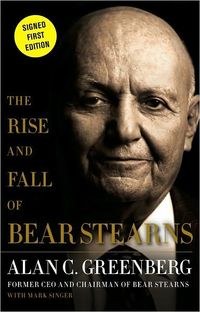

Purchase
Simon & Schuster
June 2010
On Sale: June 1, 2010
213 pages
ISBN: 1416562885
EAN: 9781416562887
Hardcover
Add to Wish List
Non-Fiction
On March 16, 2008, Alan Greenberg, former CEO and current
chairman of the executive committee of Bear Stearns, found
himself in the company's offices on a Sunday. More
remarkable by far than the fact that he was in the office on
a Sunday is what he was doing: participating in a meeting of
the board of directors to discuss selling the company he had
worked decades to build for a fraction of what it had been
worth as little as ten days earlier. In less than a week the
value of Bear Stearns had diminished by tens of billions of
dollars. As Greenberg recalls, "our most unassailable
assumption?that Bear Stearns, an independent investment firm
with a proud eighty-five-year history, would be in business
tomorrow?had been extinguished. . . . What was it, exactly,
that had happened, and how, and why?" This book provides
answers to those questions from one of Wall Street's most
respected figures, the man most closely identified with Bear
Stearns' decades of success. The Rise and Fall of Bear Stearns is Alan Greenberg's
remarkable story of ascending to the top of one of Wall
Street's venerable powerhouse financial institutions. After
joining Bear Stearns in 1949, Greenberg rose to become
formally head of the firm in 1978. No one knows the history
of Bear Stearns as he does; no one participated in more key
decisions, right into the company's final days. Greenberg
offers an honest, clear-eyed assessment of how the collapse
of the company surprised him and other top executives, and
he explains who he thinks was responsible. This is a candid,
fascinating account of a storied career and its stunning
conclusion. "Whoever coined the adage about hindsight being
twenty-twenty didn't make any allowance for astigmatism or
myopia. Whose hindsight? And from what distance? A picture
clarifies or blurs with the passage of time, and whatever
image emanates at a given instant is colored by the biases
of the observer. Knowing that my perceptions of the fall of
Bear Stearns are inevitably somewhat subjective, I've tried
to make sense of exactly what happened when and how this or
that development along the way contributed to the ultimate
outcome. I've wanted to get a fix on the moment when we
ceased controlling our own destiny - not out of intramural
curiosity but because that loss of control resonated and
replicated globally. For those of us who across decades gave
so much of ourselves to Bear Stearns, what took place during
a single week in March 2008 was a watershed in our lives.
With sufficient time and distance, as the context expanded,
we could recognize it as the signal event of an enormous
disruption that the world will be struggling to recover from
for years to come."
Comments
No comments posted.
Registered users may leave comments.
Log in or register now!
| 


 © 2003-2025 off-the-edge.net
all rights reserved Privacy Policy
© 2003-2025 off-the-edge.net
all rights reserved Privacy Policy